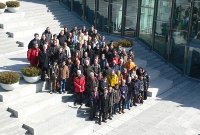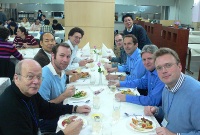 |
 |
|||||||||||||
|
|||||||||||||
|
|||||||||||||
|
In mid February detector scientists from around the world met in two subsequent detector meetings held in Korea: the ILD (International Large Detector) Workshop at Ewha Campus Complex in Seoul from 16 to 18 February and the CALICE (Calorimeter for the Linear Collider Experiment) Collaboration Spring Meeting at Kyungpook National University in Daegu from 19 to 20 February.
The purpose of the ILD workshop is to prepare, discuss, and write the Letter of Intent (LOI) for the planned detector ILD, to be submitted to the ILC Research Director and his advisory group IDAG by the end of March. ILD was formed in June 2007 when the Asia-based GLD (Global Large Detector) and the Europe-based LDC (Large Detector Concept) combined their two detector concepts, and now consists of a gas-based central tracker (TPC) and calorimeter optimised by a particle flow algorithm. The last workshop was held at Cambridge University in the UK and focused on setting the parameters for the ILD detector. The team continued its effort in Seoul to write and discuss the LOI. “We have completed around three quarters of the LOI manuscripts,” says Hitoshi Yamamoto, one of the ILD 'spokespersons'. “We have also started the review process. Reviewers are appointed to sections of the LOI, ranging from general sections to physics performance and detector optimisation, subdetector design and R&D, and the machine-detector interface issues.” The host nation, Korea, has been involved in the R&D for silicon and scintillator-based electromagnetic calorimetry, in collaboration with a Japanese team, and hopes to advance this effort to the international R&D collaboration in hadron calorimetry. “I am very happy with the progress on R&D so far,” says DongHee Kim, organiser of the ILC workshop. “We were able to build two prototypes of the electronics for the electromagnet calorimeter and tested them. The scintillator strips were produced in Korea, and the quality of the strips is getting much better.” He also notes that Korea welcomes these meetings as can enhance the detector research activities in the nation, as well as the public understanding. Read more about the results of the CALICE meeting and the Korean contribution to the collaboration in a future issue of ILC NewsLine. -- Misato Hayashida |
|||||||||||||
| © International Linear Collider |

